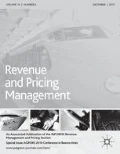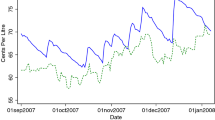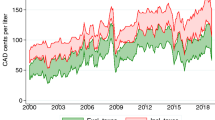Abstract
Retail gasoline demand can be modelled using proprietary site level sales data for one operator or aggregate market share data covering all brands within a region. We show how to incorporate standard demand models for these situations into Bayesian hierarchies in which the effect of brand on price elasticity can be estimated. For site level data, we show how to estimate brand effect on the distribution of competitor cross elasticities and, in the case of multi-branded operators, on the distribution of direct elasticities. For market share data, we show how to estimate regional average direct elasticities by brand.









Similar content being viewed by others
References
Bennavail, J.-C., Harding, T. and Spears, D. (1990) An Experiment on the Use of a Knowledge Support System for Dynamic Pricing of Gasoline Products in France, Proceedings of the IEEE International Conference on Systems, Man and Cybernetics; 4–7 November, Los Angeles. Piscataway, NJ: IEEE, pp. 861–866.
Clayclamp, H. (1966) Dynamic effects of short duration price differentials on retail gasoline sales. Journal of Marketing Research 3 (2): 175–178.
Cohen, M. (1999) Pricing peculiarities of the UK petrol market. Journal of Product and Brand Management 8 (2): 153–162.
Eckert, D.S. and West, A. (2004) Retail gasoline price cycles across spatially dispersed gasoline stations. Journal of Law and Economics 47 (1): 245–273.
Erdem, T., Swait, J. and Louviere, J. (2002) The impact of brand credibility on consumer price sensitivity. International Journal of Research in Marketing 19 (1): 1–19.
Faber, R.P. (2009) Asymmetric Price Responses of Gasoline Stations: Evidence for Heterogeneity of Retailers. Tinbergen Institute Discussion Papers 2009-106/1.
Krasteva, E., Singh, M., Sotirov, G., Bennavail, J.-C. and Mincoff, N. (1994) Model Building for Pricing Decision Making in an Uncertain Environment, Proceedings of the IEEE International Conference on Systems, Man and Cybernetics; 2–5 October, San Antonio. Piscataway, NJ: IEEE, pp. 194–199.
Montgomery, A.L. (2002) Reflecting uncertainty about economic theory when estimating consumer demand. In: T.B. Formby and R. Carter Hill (eds.) Advances in Econometrics 16. Bingley, Yorkshire, England: Emerald Group Publishing, pp. 257–294.
Montgomery, A.L. and Rossi, P.E. (1999) Estimating price elasticities with theory based priors. Journal of Marketing Research 36 (4): 413–423.
Ning, X. and Haining, R. (2003) Spatial pricing in interdependent markets: A case study of petrol retailing in Sheffield. Environment and Planning A 35 (12): 2131–2159.
Noel, M.D. (2007a) Edgeworth price cycles, cost-based pricing and sticky pricing in retail gasoline markets. Economics & Statistics 89 (2): 324–334.
Noel, M.D. (2007b) Edgeworth price cycles: Evidence from the Toronto retail gasoline market. Journal of Industrial Economics 55 (1): 69–92.
Raudenbush, S. and Bryk, A. (2002) Hierarchical Linear Models. Thousand Oaks, CA: Sage.
Rossi, P.E., Allenby, G.M. and McCulloch, R. (2005) Bayesian Statistics and Marketing. Chichester, UK: John Wiley.
Singh, M.G. and Bennavail, J.-C. (1993) Experiments in the use of a knowledge support system for the pricing of gasoline products. Information & Decision Technologies 18 (6): 427–442.
Slade, M. (1992) Vancouver's gasoline price wars: An empirical exercise in uncovering supergame strategies. Review of Economic Studies 59 (2): 257–276.
van Nierop, E., Fok, D. and Franses, P.H. (2002) Sales Models for Many Items Using Attribute Data, ERIM Report Series ERS-2002-65-MKT. Rotterdam, the Netherlands: Erasmus Research Institute of Management.
Author information
Authors and Affiliations
Corresponding author
Rights and permissions
About this article
Cite this article
McCaffrey, D., Liptrot, T. & Jenkins, B. Retail gasoline pricing: A Bayesian hierarchical approach to modeling the effect of brand on elasticity. J Revenue Pricing Manag 10, 514–527 (2011). https://doi.org/10.1057/rpm.2011.30
Received:
Revised:
Published:
Issue Date:
DOI: https://doi.org/10.1057/rpm.2011.30




